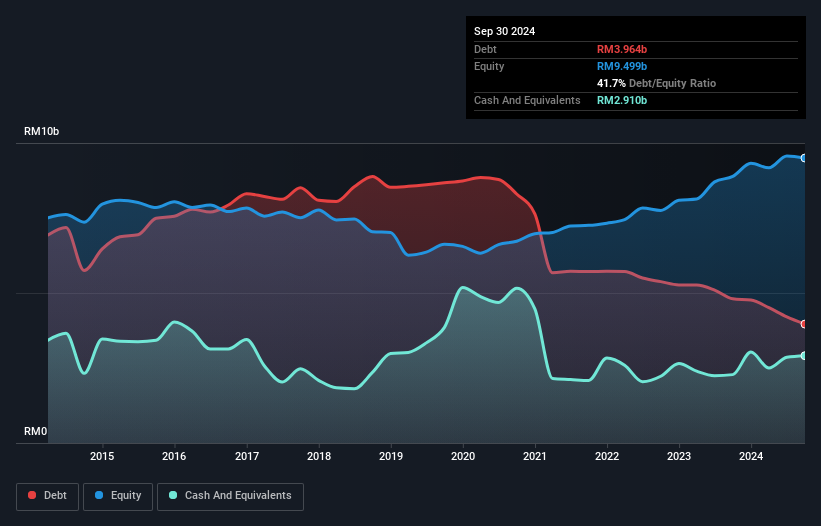We Think Telekom Malaysia Berhad (KLSE:TM) Can Manage Its Debt With Ease

Warren Buffett famously said, 'Volatility is far from synonymous with risk.' So it might be obvious that you need to consider debt, when you think about how risky any given stock is, because too much debt can sink a company. We can see that Telekom Malaysia Berhad (KLSE:TM) does use debt in its business. But is this debt a concern to shareholders?
When Is Debt A Problem?
Debt assists a business until the business has trouble paying it off, either with new capital or with free cash flow. If things get really bad, the lenders can take control of the business. However, a more common (but still painful) scenario is that it has to raise new equity capital at a low price, thus permanently diluting shareholders. Having said that, the most common situation is where a company manages its debt reasonably well - and to its own advantage. When we examine debt levels, we first consider both cash and debt levels, together.
See our latest analysis for Telekom Malaysia Berhad
What Is Telekom Malaysia Berhad's Net Debt?
You can click the graphic below for the historical numbers, but it shows that Telekom Malaysia Berhad had RM3.96b of debt in September 2024, down from RM4.81b, one year before. On the flip side, it has RM2.91b in cash leading to net debt of about RM1.05b.

A Look At Telekom Malaysia Berhad's Liabilities
According to the last reported balance sheet, Telekom Malaysia Berhad had liabilities of RM6.27b due within 12 months, and liabilities of RM5.13b due beyond 12 months. Offsetting this, it had RM2.91b in cash and RM3.45b in receivables that were due within 12 months. So its liabilities total RM5.05b more than the combination of its cash and short-term receivables.
Of course, Telekom Malaysia Berhad has a market capitalization of RM25.3b, so these liabilities are probably manageable. Having said that, it's clear that we should continue to monitor its balance sheet, lest it change for the worse.
We use two main ratios to inform us about debt levels relative to earnings. The first is net debt divided by earnings before interest, tax, depreciation, and amortization (EBITDA), while the second is how many times its earnings before interest and tax (EBIT) covers its interest expense (or its interest cover, for short). This way, we consider both the absolute quantum of the debt, as well as the interest rates paid on it.
Telekom Malaysia Berhad's net debt is only 0.24 times its EBITDA. And its EBIT easily covers its interest expense, being 12.3 times the size. So we're pretty relaxed about its super-conservative use of debt. Another good sign is that Telekom Malaysia Berhad has been able to increase its EBIT by 23% in twelve months, making it easier to pay down debt. When analysing debt levels, the balance sheet is the obvious place to start. But ultimately the future profitability of the business will decide if Telekom Malaysia Berhad can strengthen its balance sheet over time. So if you're focused on the future you can check out this free report showing analyst profit forecasts.
Finally, a business needs free cash flow to pay off debt; accounting profits just don't cut it. So it's worth checking how much of that EBIT is backed by free cash flow. During the last three years, Telekom Malaysia Berhad produced sturdy free cash flow equating to 69% of its EBIT, about what we'd expect. This free cash flow puts the company in a good position to pay down debt, when appropriate.
Our View
Telekom Malaysia Berhad's interest cover suggests it can handle its debt as easily as Cristiano Ronaldo could score a goal against an under 14's goalkeeper. And that's just the beginning of the good news since its net debt to EBITDA is also very heartening. Zooming out, Telekom Malaysia Berhad seems to use debt quite reasonably; and that gets the nod from us. After all, sensible leverage can boost returns on equity. There's no doubt that we learn most about debt from the balance sheet. But ultimately, every company can contain risks that exist outside of the balance sheet. We've identified 1 warning sign with Telekom Malaysia Berhad , and understanding them should be part of your investment process.
If, after all that, you're more interested in a fast growing company with a rock-solid balance sheet, then check out our list of net cash growth stocks without delay.
Valuation is complex, but we're here to simplify it.
Discover if Telekom Malaysia Berhad might be undervalued or overvalued with our detailed analysis, featuring fair value estimates, potential risks, dividends, insider trades, and its financial condition.
Access Free AnalysisHave feedback on this article? Concerned about the content? Get in touch with us directly. Alternatively, email editorial-team (at) simplywallst.com.
This article by Simply Wall St is general in nature. We provide commentary based on historical data and analyst forecasts only using an unbiased methodology and our articles are not intended to be financial advice. It does not constitute a recommendation to buy or sell any stock, and does not take account of your objectives, or your financial situation. We aim to bring you long-term focused analysis driven by fundamental data. Note that our analysis may not factor in the latest price-sensitive company announcements or qualitative material. Simply Wall St has no position in any stocks mentioned.
About KLSE:TM
Telekom Malaysia Berhad
Engages in the establishment, maintenance, and provision of telecommunications and related services in Malaysia and internationally.
Flawless balance sheet, good value and pays a dividend.


